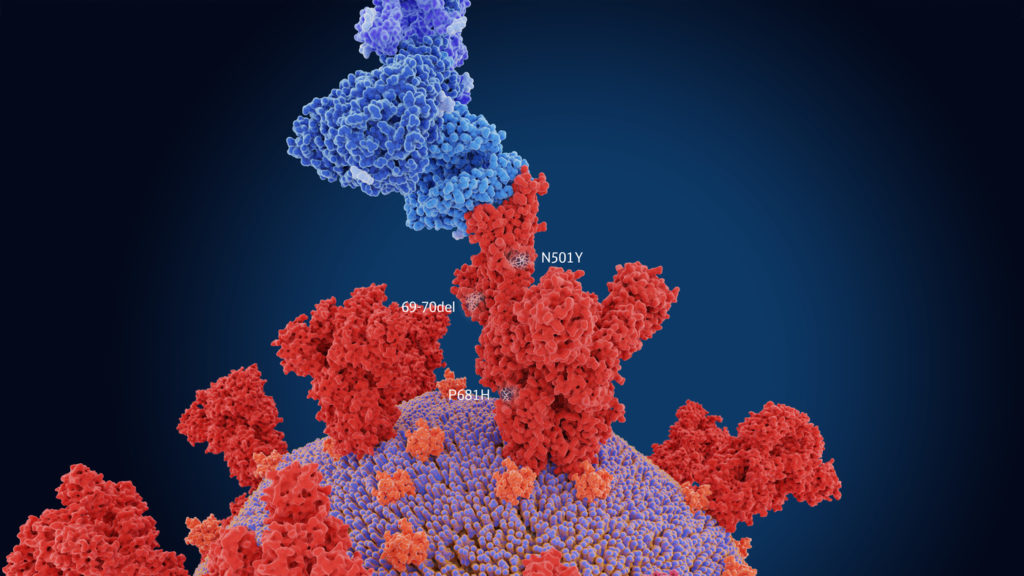Is The Variant From India The Most Contagious Coronavirus Mutant On The Planet?
END CLASS=”STORYTITLE”
END CLASS=”STORY-TOOLS”
END ID=”STORY-META” CLASS=”STORY-META HAS-BYLINE”
Is The Variant From India The Most Contagious Coronavirus Mutant On The Planet?

The numerals in the illustration show the main mutation sites of the B.1.1.7 variant first detected in the U.K., which is more transmissible than other variants. Here, the virus’s spike protein (red) is bound to a human cell (blue).
Juan Gaertner/Science Source
hide caption
toggle caption
The numerals in the illustration show the main mutation sites of the B.1.1.7 variant first detected in the U.K., which is more transmissible than other variants. Here, the virus’s spike protein (red) is bound to a human cell (blue).
Scientists in the U.K. now say that one of the variants from India, known as B.1.617.2, is highly contagious and likely more transmissible than the variant from the U.K., B.1.1.7.
“Transmission of this variant is currently faster than that of the B.1.1.7 variant,” the U.K.’s Scientific Advisory Group for Emergencies wrote Friday in a document. “It is a realistic possibility that it is as much as 50% more transmissible.”
If that’s correct, it would mean B.1.617.2 is 225% more transmissible than the original SARS-CoV-2 strains, and it would make B.1.617.2 the most contagious one on the planet.
Tom Wenseleers, an evolutionary biologist at the KU Leuven university in Belgium, has been using computer models to estimate how fast B.1.617 is spreading in India. He finds a similar trend as the U.K. scientists.
END ID=”RES994781826″ CLASS=”BUCKETWRAP INTERNALLINK INSETTWOCOLUMN INSET2COL ”
“Based on this data, the new variant from India has a very big transmission or growth advantage,” even over B.1.1.7, he says. “It’s kind of like the U.K. variant squared.”
This advantage, Wenseleers believes, is fueling the massive outbreak in India, on top of other contributing factors, such as recent mass gatherings, election rallies and relaxing of precautions.
Over the winter, the situation in India looked great. COVID-19 case numbers were flat and even dropping.
Then in the middle of February and early March, the situation quickly shifted. The virus surged explosively. Now India is battling a horrific second wave of COVID-19, reporting about 400,000 cases and more than 3,500 deaths every day.
At the same time, the new variant that emerged in India, known as B.1.617, began to dominate the outbreak in several Indian states. This variant has more than a dozen mutations, including several known to enhance transmissibility and help the virus evade the immune system.
END ID=”RES994781616″ CLASS=”BUCKETWRAP INTERNALLINK INSETTWOCOLUMN INSET2COL ”
Other variants are also circulating in India, including B.1.351 from South Africa and B.1.1.7 from the U.K. To figure out which variant is spreading the fastest, Wenseleers used a mathematical model to estimate how quickly cases of each variant are rising in several regions. He found cases of B.1.617 to be rising at a faster rate than cases of B.1.1.7 in three states in India as well as in the United Kingdom.
“If you take all these pieces of evidence together, I’m fairly confident that the variant from India has a growth advantage and that is a reason for the current epidemic in India,” he says.
Of course, there are several caveats here. The findings are preliminary and haven’t been published, except on Twitter. “And the data are still very limited,” he says. “The number of variant sequences that’s available for India is quite small, especially considering the size of the country and the population.”
For these reasons, other researchers are again dubious of Wenseleers’ findings.
Karthik Gangavarapu, who’s a computational biologist at Scripps Research Institute, is one of them. “I don’t think the story is clear yet,” he says. “I’m not saying B.1.617 isn’t more transmissible than B.1.1.7, I’m just saying there’s a burden of proof you need to establish before you can say that.”
Still though, Gangavarapu says, there’s no question the variant that emerged in India is worrisome — and something the whole world needs to try and stop together.
END CLASS=”TAGS”
END CLASS=”SHARE-TOOLS SHARE-TOOLS–SECONDARY” ARIA-LABEL=”SHARE TOOLS”
END ID=”NEWSLETTER-ACQUISITION-CALLOUT-DATA” DATA-NEWSLETTER=”{“NEWSLETTERID”:”GOATS-AND-SODA”,”TITLE”:”GOATS AND SODA”,”MARKETINGHEADER”:”SIGN UP FOR THE GOATS AND SODA NEWSLETTER”,”FREQUENCY”:”EVERY WEEK”,”SHORTDESCRIPTION”:”FROM A TO ZIKA, GET THE LATEST GLOBAL HEALTH AND DEVELOPMENT NEWS, SENT WEEKLY.”,”STICKYDESCRIPTION”:”GET THE LATEST IN GLOBAL HEALTH AND DEVELOPMENT WITH THE WEEKLY GOATS AND SODA NEWSLETTER.”,”CONTENTIMAGE”:”HTTPS://MEDIA.NPR.ORG/ASSETS/IMG/2018/08/03/NEWSLETTERS/GOATS_AND_SODA.PNG”,”STATICMARKUPDIR”:”/BUCKETS/BLOGS/GOATSANDSODA/SUBNAV.HTML”,”BRANDINGDIR”:”/BRANDING/SECTIONS/GOATSANDSODA/”,”BRANDINGLINK”:”HTTPS://WWW.NPR.ORG/SECTIONS/GOATSANDSODA/”,”ORGANIZATIONID”:1,”RECAPTCHASITEKEY”:”6LFD6CYUAAAAAIBEUEKWZ9KCJF4UYLFTU7NWNAEK”}”
END ID=”PODCAST-CALLOUT-DATA” DATA-PODCAST=”{“NAME”:”SHORT WAVE”,”ITUNESURL”:”HTTPS://PODCASTS.APPLE.COM/PODCAST/ID1482575855?MT=2&AT=11L79Y&CT=NPRDIRECTORY”,”GOOGLEPODCASTSURL”:”HTTPS://WWW.GOOGLE.COM/PODCASTS?FEED=AHR0CHM6LY93D3CUBNBYLM9YZY9YC3MVCG9KY2FZDC5WAHA_AWQ9NTEWMZUX”,”RSSURL”:”HTTPS://FEEDS.NPR.ORG/510351/PODCAST.XML”,”JSONFEEDURL”:”HTTPS://FEEDS.NPR.ORG/FEEDS/994710459/FEED.JSON”,”NPRONEUNIVERSALURL”:”HTTPS://RPB3R.APP.GOO.GL/SHORTWAVE”,”AMAZONALEXAURL”:”HTTPS://WWW.AMAZON.COM/DP/B07YVN9QYD/”,”POCKETCASTSURL”:”HTTPS://PCA.ST/I925AR8Q”,”SPOTIFYURL”:”HTTPS://OPEN.SPOTIFY.COM/SHOW/2RTT1KLKUOQNUAW2AH19PA”,”BRANDINGURL”:”HTTPS://MEDIA.NPR.ORG/ASSETS/IMG/2019/09/19/SHORTWAVE-TILE_FINAL2_SQ-266C8CC0CD2CB3E6213B36CBD0009CBD3331A990.PNG”}”
END ID=”CALLOUT-END-OF-STORY-MOUNT”
END ID=”END-OF-STORY-RECOMMENDATIONS-MOUNT” CLASS=”RECOMMENDED-STORIES” ARIA-LABEL=”RECOMMENDED STORIES”
Source: India Variant May Be Up To 50% More Transmissible Than U.K. Variant : Goats and Soda : NPR
